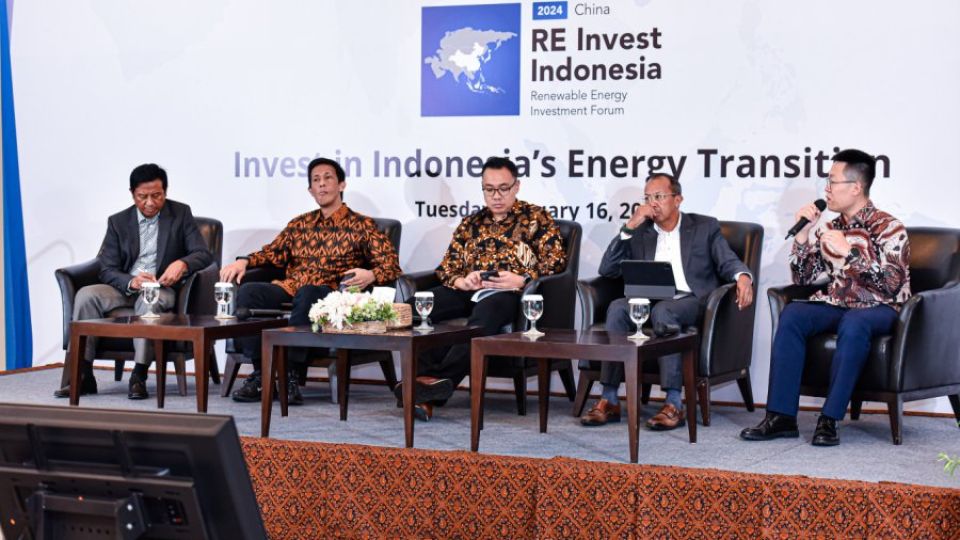January 18, 2024
JAKARTA – Chinese investors say regulatory constraints are preventing them from making the investments they would like to in renewable energy projects in Indonesia and have asked the government to change its policies for the sector.
The president of the China Chamber of Commerce in Indonesia, Wang Kun, highlighted a regulation that required state-owned electricity company PLN to own at least a 51 percent share of energy projects in the country, a proportion some Chinese investors found burdensome.
Wang added that Chinese investors also found Indonesia’s local content requirements difficult to meet and suggested that the government provide more flexibility in the policy.
“In some cases, we cannot source locally,” Wang told audiences on Tuesday at the China RE Invest Indonesia event hosted by Tenggara Strategics, a think tank affiliated with The Jakarta Post.
Zhao Fengjun, senior development manager of PowerChina in Indonesia said the tender process for renewable energy projects lacked clarity and that investors often needed to wait for long periods for approval.
“For investors, they cannot wait,” Zhao said at the same event.
Read also: Indonesia to abandon 23% renewable energy target
Zhao also noted that some Chinese firms had set up manufacturing facilities in Indonesia to meet local contents requirements and that they would need a market for their products, which he said would only exist if renewable projects could commence.
Chinese investors also hoped the government’s renewable energy tariff policy could be changed, citing a presidential decree that put price caps on certain types of renewables projects.
“So, if [the government can provide] more attractive prices, I think we are on track when it comes to investments,” Zhao said.
Zhao also asked for clarity on planned revisions to the country’s long-term electricity procurement plan (RUPTL), which neither the government nor PLN officials in the event could provide a firm answer on.
“It is an important guideline for foreign investors coming to Indonesia because they need to see the market, whether we can get [into the] market or not,” Zhao said.
Indonesia’s realized renewable energy investment of US$1.5 billion in 2023 was the lowest in years, falling short of the $1.8 billion annual target, which the government had already halved from the initial target.
Policymakers plan to cut the 2025 target for renewables in the country’s energy mix from 23 percent to between 17 and 19 percent, claiming they need to be “realistic” about what the country can achieve.
For years, Indonesia has missed its renewable energy targets.
Experts say the decline in renewables investment can be attributed to unresolved structural and financial barriers in the sector. This includes a national electricity oversupply owing to the widespread use of coal-fired power plants, which limits the incentive to develop new renewable projects.
Andriah Feby Misna, the Energy and Mineral Resources Ministry’s director of renewable energy, suggested at the same event that investors should opt to become independent power producers (IPP) instead so that they could wholly own the power plants they built in the country.
Read also: Yearender: A sobering year for the energy transition
Meanwhile, Rachmat Kaimuddin, head of the implementation team of the National Energy Transition Task Force, defended Indonesia’s local content policy at the event, saying it would improve local manufacturing capabilities, but he claimed the government would make the rules more manageable.
He noted that the government had cut the local content requirement for the solar panel industry to 40 percent from the previous 60 percent until the end of this year but that it would go up to the initial figure afterward, as the country was seeking to develop a local solar panel industry.
Eka Satria, chair of energy and mineral resources at the Indonesian Employers Association (APINDO), said the country needed more preferential policies to attract investment in renewable energy, especially with regard to fair pricing in the energy sector.
He cited Indonesia’s heavy fossil fuel subsidies as the elephant in the room. While they made energy more affordable for general public, he said, they had made it difficult for renewables to compete with existing power plants.
“The question is, why can’t the government allocate some of the subsidies from other sectors to the green sector?” Eka said.
Meanwhile, Sapto Aji Nugroho of PLN’s corporate business and investment division said the company remained committed to accelerating the development of renewable energy in Indonesia, a goal that would be reflected in an upcoming revised long-term procurement plan.


